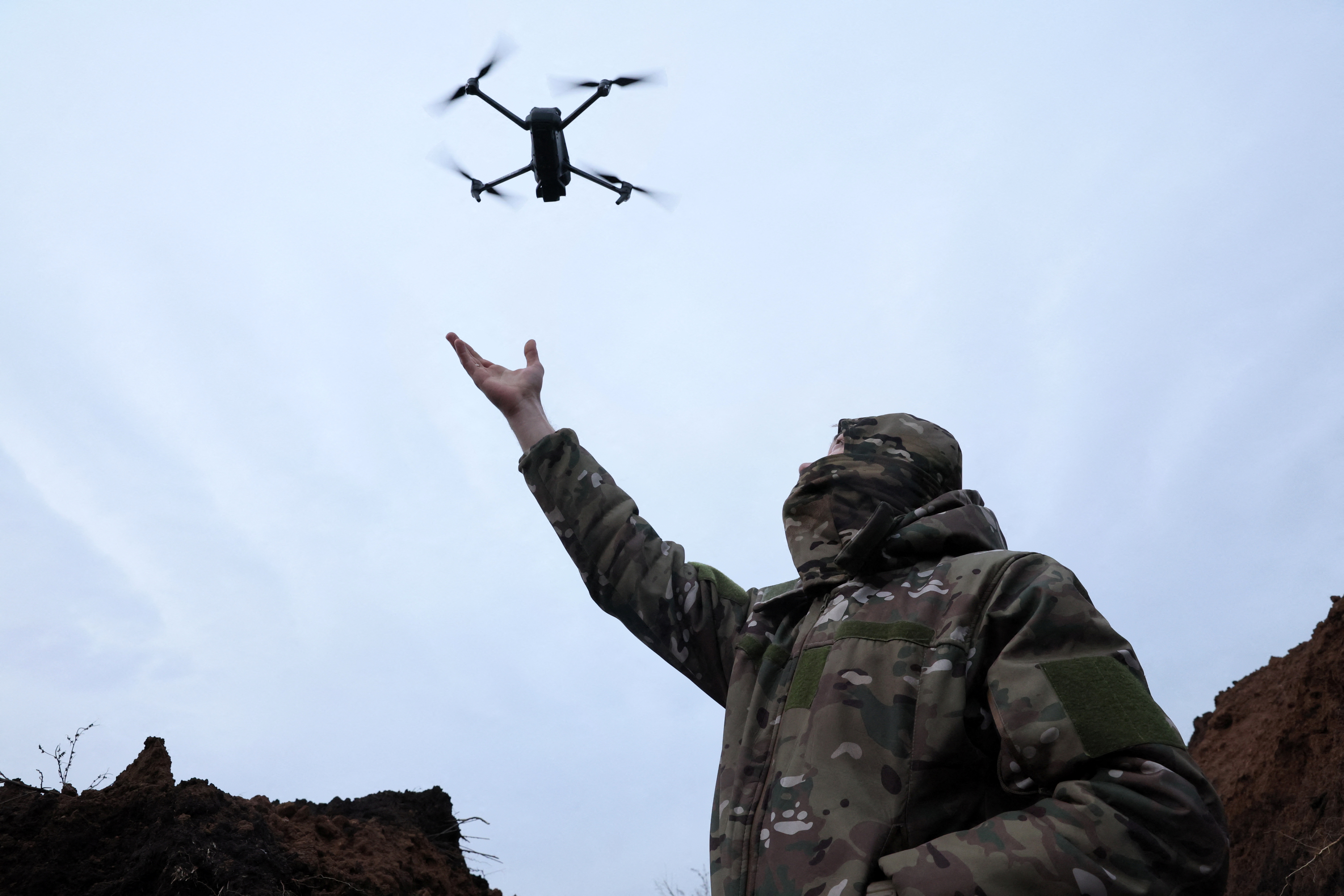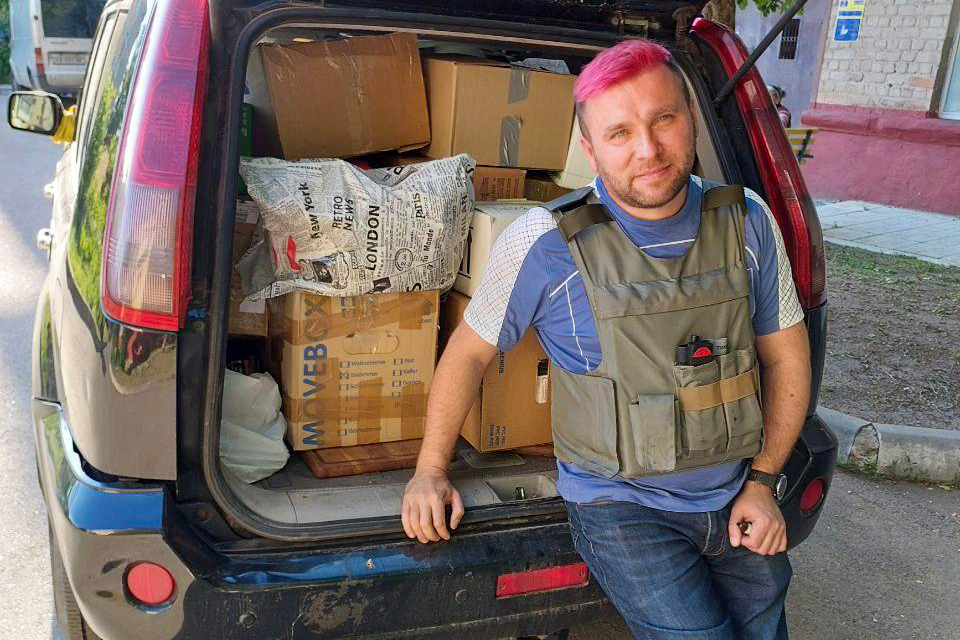
When Russian forces crossed the Ukrainian border and surged towards Kharkiv, Serhiy Evdokimov got into his car and started driving. “The city was filled with checkpoints and blockades,” he recalled. “I just stopped at any checkpoint and asked: ‘What assistance do you need? Hot drinks, tea, coffee, energy drinks, warm clothes?’”
Kharkiv, just 30km (19 miles) from the border, was the site of some of the fiercest fighting at the beginning of the conflict. Evdokimov, an engineer working for the Swedish-Ukrainian software company Sigma, spent those first weeks working to source and deliver supplies to soldiers manning the city’s defences, and to civilians sheltering in underground metro stations and basements.
As the defenders slowly pushed Russian forces beyond the city limits, he followed them, shuttling hundreds of hot meals a day from restaurants in Kharkiv to soldiers entrenched in forests.
Evdokimov was one of more than 700 Sigma employees based in Kharkiv when Russia invaded in February 2022. While he was delivering aid, the company was working to evacuate its staff and their families from the warzone.
They weren’t entirely unprepared. For months before the invasion began, the company’s leadership had done tabletop planning exercises, and built some contingencies, but the speed of the Russian advance took them by surprise, and meant the plan had to be readjusted.
The week before the war, they had booked a fleet of buses ready to take people out. “But once it started, the problem was the bus drivers refused to go,” Evgeniy Bachinskiy, Sigma’s head of compliance, who oversaw the evacuation plan, told Al Jazeera.
It took two weeks to get everyone who wanted to leave Kharkiv out of the city and into the relative safety of the west of the country. Some evacuees from the east slept in the company’s Kyiv headquarters. It was a chaotic period, but soon, the company was back up and running.
“All we need to operate is, you know, a person, an internet connection and a laptop,” Bachinskiy said. “Within two weeks, I think 95 percent of our people were actually operating.”
Many tech companies in Ukraine have a similar story. Executives who had previously focused on profit and loss accounts suddenly had to become experts in logistics and humanitarian relief, figuring out how to extract their people under fire and to keep their businesses running with teams that were scattered by the war.
By and large, they succeeded, and the industry not only survived, but thrived, growing against the odds, bringing in money, keeping people in work as the rest of the economy struggled, and directly supporting the war effort by pivoting to create battlefield technology.
As the war enters its third year, some of the gloss has come off that miracle. It’s become harder to get investment and clients from overseas, and the sector is suffering from brain drain and fatigue. But, tech leaders say, the resilience that the industry built in the early days of the conflict is intact.
“We are of course tired,” said Oleg Polovynko, a tech entrepreneur and adviser to the mayor of Kyiv on technology. “But we are not demoralised.”
‘A very high-risk country’
Ukraine’s tech industry was growing well before the full-scale invasion. A large, young, well-educated workforce made it a natural place for companies in Western Europe to set up back offices for software development and tech support. Local entrepreneurs built a tech outsourcing industry that worked with clients all over the world. The startup scene was buzzing, accumulating around new high-tech campuses in Kyiv, Lviv and Kharkiv.

The government, keen to recalibrate the economy away from Soviet-era heavy industries, created tax breaks and other business support under its “Diia City” initiative. According to data from the IT Association of Ukraine, technology exports nearly tripled between 2017 and 2021, hitting more than $7bn.
In 2022, even with thousands of its component companies working out of basements, on generators and Starlink connections, the industry actually grew. While Ukraine’s economy shrunk by nearly a third, its tech exports rose close to six percent. Global tech companies rushed to support the country, announcing investments, donating computing resources and giving enterprise support. Many of the sector’s international clients pledged to continue working with Ukrainians, despite the risks.
“It was a shock for everyone; everyone wanted to help Ukraine,” said Iryna Volnytska, founder of SET, a tech-focused university in Kyiv. “Sometimes it felt like a donation, not business, but the response was huge.”
It was always going to be hard to sustain the momentum, and in 2023, tech exports slid back to below their 2021 total. “It’s been two years,” Volnytska told Al Jazeera. “There is a crisis in the world, a recession. You don’t hear about Ukraine a lot in the world right now.”
Many tech companies are finding it difficult to find new clients. “Ukraine is a very high-risk country. Anytime your tech specialist can be drafted to the army or killed,” Volnytska said. Men of military age aren’t allowed to leave the country, so they can’t go overseas to meet potential clients or partners.
Venture capitalists say they want to work with Ukraine, but that they need to de-risk their investments. That means they’re reluctant to invest in a business whose entire management team and infrastructure is based in Ukraine.
Some startups have adapted by setting up offices outside the country, and there are now Ukrainian tech clusters in Warsaw, Berlin and other European cities, as well as outposts in Silicon Valley in the United States. The number of women working in senior positions in the industry has grown, which has helped startups to build internationally.
But the dangers and difficulties of living and working in a country at war have led many people to leave. Research from the Lviv IT Cluster, an incubator, found that 65,000 Ukrainian tech professionals are now living outside the country. “It’s the hardest question for Ukraine,” Volnytska said. “We have a huge brain drain.”

Ukraine needs tech talent. The country has leaned heavily on its startups to help it fight the far larger Russian military. A fast-growing military tech industry is leading the world in innovations in drones, cybersecurity and other battlefield tools. Since the war began, global defence companies have flocked to the country to invest in promising new tech, try out their tools and gather data. Once the war is over, the tech industry will be an important source of jobs and investment to rebuild a devastated economy.
‘A lot of Plan Bs’
“Now, it’s bad. But it’s also a chance for us to rebuild from scratch, and to build a more innovative country,” Volnytska told Al Jazeera. “A lot of traditional industries were ruined. So do we want to build new factories, or do we want to build some innovative tech companies?”
Volnytska’s SET launched two months before the full-scale invasion, hoping to prepare students to become tech entrepreneurs. Like the rest of the tech ecosystem, they’ve had to adapt, taking their courses online and adapting the curriculum to the current reality.
In May 2022, after the invasion, they launched a cybersecurity course. Five and a half thousand people applied. The university is preparing to launch an international programme, focused on cities with large populations of Ukrainian refugees.
“Our students will study for one year in Poland, a second year in Berlin, for example, the next year in London, and for the last year, we want to bring them back to Kyiv, to show them that there are still opportunities in Ukraine,” Volnytska said.
As the second anniversary of the full-scale invasion is approaching, the global narrative around Ukraine has been dominated by the domestic politics within its international allies.
US military aid has been held up by debates in Congress. While the tech industry in general has remained supportive of Ukraine, X owner Elon Musk has amplified Russian propaganda, including boosting a controversial interview of Russia’s President Vladimir Putin by the right-wing provocateur Tucker Carlson. On the ground, the kinetic war has reached a grinding stalemate.
“There definitely was fatigue a couple of months ago,” said Denys Gurak, a tech entrepreneur and venture capitalist who played a significant role in lobbying the US tech sector for support in the early days of the conflict. People had “inflated expectations” of the military’s ability to launch a counteroffensive. But, he says, that moment has passed.
“Frankly, I’m feeling like people just realise nothing has changed,” Gurak said. “We still need to do the job. We cannot allow ourselves to be fatigued.” Based in the US for years now, he is relocating back to Ukraine next month.
Evdokimov is still in Kharkiv. The city continues to be bombarded by Russian drones and missiles, and he now combines his day job as an engineer with a role as the head of Sigma’s charitable fund.
Living and working so close to the war means having “a lot of plan Bs”, he says.
“In case of power outages, I have power supplies, including diesel and petrol supplies. In case of internet connection outages, I have three or four internet channels booked and reserved in different geographical areas of Kharkiv.”
It’s not back to normal, and there are days when the emotional burden takes a toll. “[But] life has not stopped here,” Evdokimov said. “We work; we are OK.”







